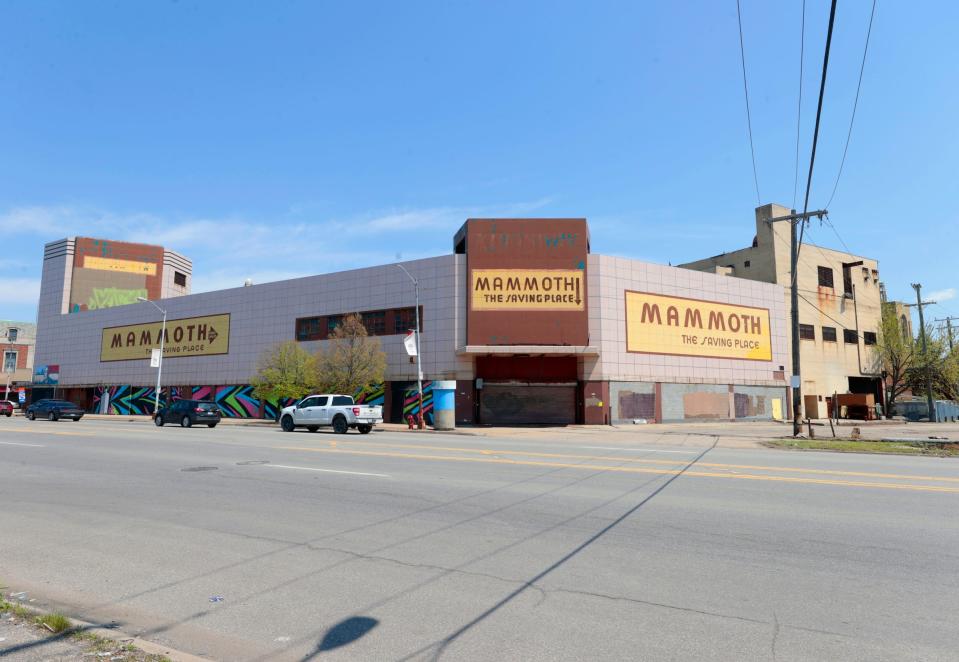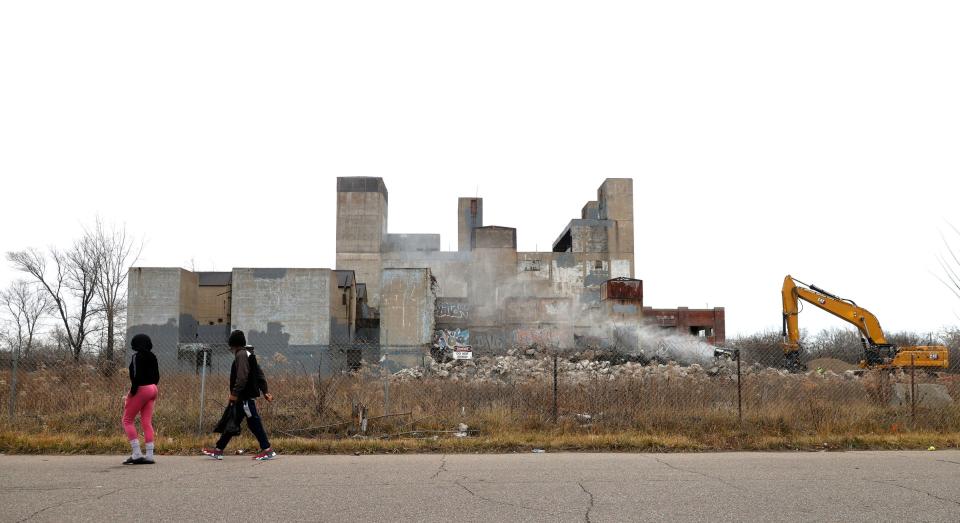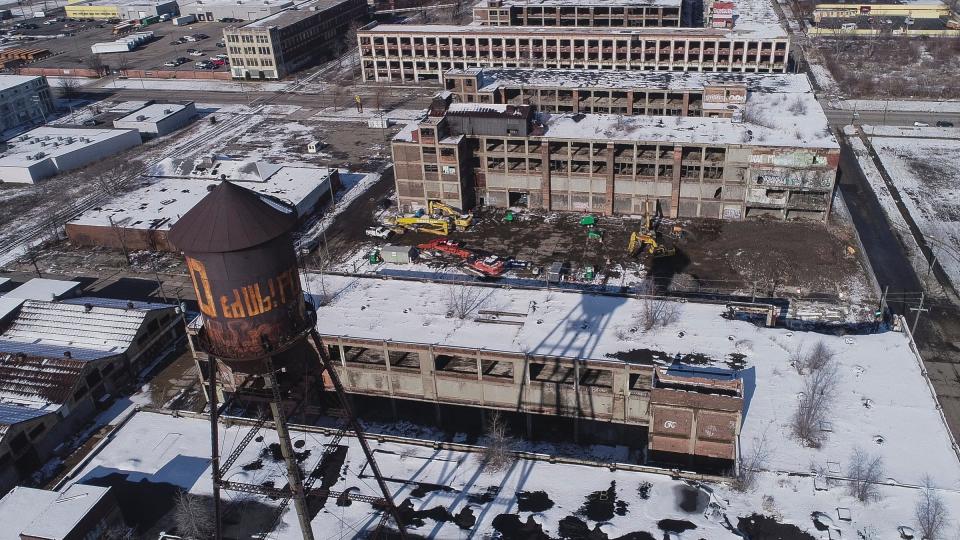Editorial: Duggan’s Detroit property tax shift is important, necessary
- Oops!Something went wrong.Please try again later.
MACKINAC ISLAND — Detroiters face a twin burden: High property taxes. Vacant land or derelict buildings that dot the city's neighborhoods, havens for illegal dumping and criminal activity.
Detroit Mayor Mike Duggan proposes to tackle both by repairing a profound inequity in the way Detroit property is taxed.
The mayor, who spoke at the Detroit Regional Chamber's annual policy conference, held last week on Mackinac Island, wants to adopt a new tax structure called the land value tax. The change would cut the tax rate for functioning businesses and homeowners by 30%, while tripling the tax on vacant lots, lots with derelict buildings, other unoccupied parcels like parking lots or scrapyards.
Other cities have adopted the land value tax. Last year, the Lincoln Institute of Land Policy examined how it might work in Detroit.
Our tax systems are constructed around the idea that land has positive value. Here's a hard truth: While property values have soared in downtown, Midtown and some Detroit neighborhoods, in too much of the city, land, particularly vacant land, has little value. And that's how it is taxed — at a low rate that disincentivizes redevelopment, new construction or even investment in repairing blighted structures.
Over decades, the property tax rate in Detroit has soared, as the collective value of property in Detroit declined by billions of dollars. Because land here has less value, landowners have had to pay at higher rates to fund city services. In cities where property has more value, lower tax rates can generate more revenue.
More: Mayor Duggan unveils policy to impose higher tax rate on vacant land
More: Slowed or stalled housing developments in Detroit hope to pick up pace
The county's tax foreclosure auction played a role in these outcomes. For years, elected officials in Detroit and Wayne County were reluctant to address the harm the auction caused. The auction of occupied homes displaced residents from structures that often stayed vacant or became blighted. It also served as a tool for speculators eager to amass cheap land in Detroit. The county now has adequate tools to help keep homeowners from losing homes to foreclosure, but the damage caused by the auction continues to unwind. Because land sells so cheaply in the auction, bulk buyers have been able to acquire vast acreage in Detroit at fire sale rates. University of Michigan researchers found that investors and bulk buyers purchased 90% of all property from the Wayne County tax foreclosure auction since it began in 2002 — and paid minimal tax on derelict structures or vacant land.
Policy can outlive its purpose. Too often, we continue to do what we've always done, because it's how we've always done it. The purpose of property tax is to generate revenue to fund essential city services, not to create an unfair burden for residents and entrepreneurs while rewarding absentee or irresponsible property owners.
Tax policy here has become fundamentally unfair. And also unwise, creating an unjust burden for responsible business and home owners.
Duggan is proposing a conceptual shift in how property is taxed in Detroit, that will align purpose and function. It is an important and necessary re-evaluation.

How Duggan's tax proposal would work
Current state law requires local assessors to slash the value ― and thus the taxes ― of both vacant lots and lots with structures so derelict they are unusable, Duggan explained in his Mackinac Island address. At the same time, occupied residential and commercial properties are taxed at a whopping 86 mills, the highest rate in the state. Many former Detroit homeowners and small businesses have been lured by more reasonable rates in Detroit’s suburbs. Duggan wants to increase the tax on vacant land to 246 mills, and cut the tax rate on buildings to 60 mills. Cutting that rate would provide a tangible boon to longtime Detroit residents, prospective new residents, old and new businesses.
Equally important, the mayor says, the tax change will prompt Detroit property owners to reconsider the value proposition of allowing vacant land or derelict buildings to languish. The average tax bill for a vacant lot, Duggan says, is $30, and there are some 30,000 neglected vacant lots from which the city must pay crews to clear illegally dumped trash and mow the grass. The foreclosure auction all but invited speculators to acquire mass quantities of land, gambling on future development boosting the property’s value. Sometimes, that means decades of waiting, while property sits unused or in disrepair.
More: Homeowner to homeless: The brutal reality of the Detroit foreclosure auction
Just eight new single family homes were built in Detroit in 2022. There are nearly 1,000 abandoned, privately owned commercial and industrial buildings in Detroit, Duggan said last week. Rehabbing a derelict building, or new construction on a vacant lot, returns the property to the 86-mill tax rate — a disincentive for many property owners.
Duggan says his proposal is revenue-neutral; increased tax on vacant land will balance the tax cut for property owners. The changes would be phased in over three years.

The challenges to the new tax proposal
Particular constituencies may object to this proposal. Those bulk buyers, for example, or the owners of scrapyards. Parking lot operators who lack the resources to convert their surface lots to structures, or small businesses with sizeable parking lots. The mayor indicated in a Thursday interview that his administration would work with responsible business owners with large parking lots who might struggle to pay a higher tax bill. Other business owners, he said, will see such a significant offset in property tax that they’ll come out ahead, even with a land tax increase.
Duggan’s proposal includes recourse for homeowners who have purchased side lots in Detroit. A city program has offered neighbors the opportunity to buy vacant lots adjacent to their properties for $200, and the mayor said 22,000 such lots have been sold. Those owners, too, should come out ahead, said the mayor — but any side lot owner who does not want to pay the new tax bill can sell the side lot back to the Detroit Land Bank Authority for the original $200 purchase price.
More: Detroit real estate game creates chaos in neighborhoods
The mayor said he does not expect objection from the Moroun family, the owners of the Ambassador Bridge and a substantial number of parcels in Detroit. The Ilitch family, a major owner and operator of downtown parking lots, has already started the process of converting many of its surface lots to parking structures in the latest phase of its District Detroit project — and those corporations will also benefit from the tax cut.
The accommodation for side lot owners is thoughtful. That kind of care must be present throughout the finished plan.

Next stop, the Legislature
House Speaker Joe Tate, D-Detroit, plans to introduce bills to authorize the tax shift in the state Legislature this fall, and Duggan hopes to bring the measure before Detroit voters in the 2024 February presidential primary. Tate's colleagues should respond with the urgency Duggan's pitch requires, but not without performing responsible due diligence.
Detroit's state lawmakers and the Detroit City Council should vet the final policy proposal carefully. Detroit residents and small businesses can’t be left in a worse spot by a policy change, and it’s on the mayor and his team to ensure the finished plan doesn’t allow that to happen.
Some policymakers worry that even with care and due diligence, Duggan's policy shift may have unintended consequences. So does the current system.
Contemplating a tax policy change that will benefit Detroit business and homeowners and make life more costly for landowners who disrespect the city is a step in the right direction.
Contact the Free Press opinion page: www.freep.com/letters.
This article originally appeared on Detroit Free Press: Editorial: Duggan’s Detroit property tax shift is important, necessary

